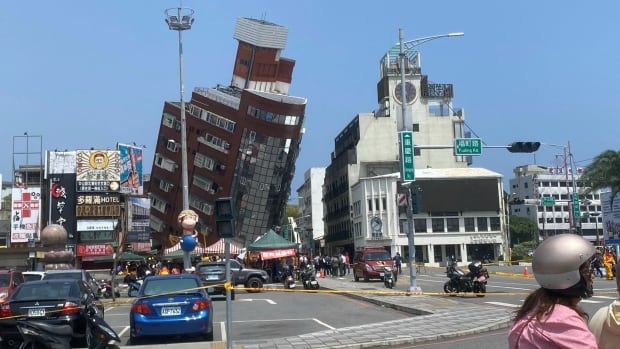The strongest earthquake in a quarter-century rocked Taiwan during the morning rush hour Wednesday, killing nine people, stranding dozens of workers at quarries and sending some residents scrambling out the windows of damaged buildings.
The quake, which also injured more than 1,000, was centered off the coast of rural, mountainous Hualien County, where some buildings leaned at severe angles, their ground floors crushed. Just over 150 kilometres away in the capital of Taipei, tiles fell from older buildings, and schools evacuated their students to sports fields, equipping them with yellow safety helmets.
Rescuers fanned out in Hualien, which contains a city of the same name, looking for people who may be trapped and using excavators to stabilize damaged buildings. The numbers of people missing, trapped or stranded fluctuated frequently as authorities learned of more in trouble and worked to locate or free them.
Taiwan’s earthquake monitoring agency said the quake was 7.2 magnitude while the U.S. Geological Survey put it at 7.4. It struck about 18 kilometres off of Hualien, on Taiwan’s east coast, and was about 35 kilometres deep.
“It was very strong. It felt as if the house was going to topple,” said Chang Yu-lin, 60, a worker in a hospital in Taipei, the capital.
Buildings shake, crumble in scenes from Taiwan’s most significant earthquake since 1999
A woman who runs bed-and-breakfast accommodation in Hualien city said she scrambled to calm her guests who were frightened by the quake.
“This is the biggest earthquake I have ever experienced,” said the woman, who asked to be identified only by her family name, Chan.
Video showed rescuers using ladders to help trapped people out of windows, while elsewhere there were massive landslides, as strong tremors in Taipei forced the subway system to close briefly, although most lines resumed service.
Rescue crews are trying to get to people left trapped after a strong earthquake rattled Taiwan, said Philippe Leblanc, a Radio-Canada reporter based in Taipei.
Taiwan’s national fire agency said nine people died in the quake.The local United Daily News reported three hikers died in rockslides in Taroko National Park and a van driver died in the same area after boulders hit the vehicle.
Series of aftershocks
Some 70 workers who were stranded at two rock quarries were safe, according to the fire agency, but the roads to reach them had been damaged by falling rocks. Six workers were going to be airlifted on Thursday.
Another 1,011 people were injured. Authorities also initially lost contact with 50 hotel employees in minibuses in the national park after the quake downed phone networks. Three of the employees managed to walk to the hotel, while the others remained stranded.
The quake and aftershocks also caused 24 landslides and damage to roads, bridges and tunnels.
Hualien Mayor Hsu Chen-wei said 48 residential buildings were damaged in the city.
Taiwan’s air force said six F-16 fighter jets had been slightly damaged at a major base in the city from which jets are often scrambled to see off incursions by China’s air force, but the aircraft are expected to return to service very soon.
Other Asian countries feel effects
Most power has been restored after the quake, electricity utility Taipower said, with the island’s two nuclear power stations unaffected.
Taiwan’s high-speed rail operator said no damage or injuries were reported on its trains, although services would be delayed as it made inspections.
A major supplier of chips to Apple and Nvidia, Taiwan Semiconductor Manufacturing Co, said it had evacuated some fabrication plants, adding later that the employees had begun to return to work.
The official central news agency said the quake was the biggest since one of magnitude 7.6 in 1999 that killed about 2,400 people and damaged or destroyed 50,000 buildings.
Taiwan weather officials ranked Wednesday’s quake in Hualien as “Upper 6,” or the second-highest level of intensity on a scale ranging from 1 to 7.
Such quakes collapse walls unless they are made of reinforced concrete blocks, while people cannot stand upright and must crawl in order to move, experts say.
The quake set off a tsunami warning for southern Japan and the Philippines that was later lifted.
In Japan, the weather agency said several small tsunami waves reached parts of the southern prefecture of Okinawa, while downgrading its tsunami warning to an advisory.
In the Philippines, seismology officials warned coastal residents in several provinces to move to higher ground.
Chinese state media said the quake was felt in the southeastern province of Fujian, while a Reuters witness said it was also felt in the commercial hub of Shanghai.
Rescue crews are searching for survivors in Taiwan after the island was hit with a 7.2 magnitude earthquake — one of the most powerful to strike there in 25 years.










